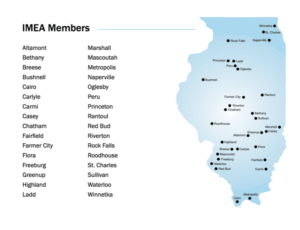June 10, 2024
Illinois Coal Plants & The Costs of Doubling Down
32 Illinois municipalities are considering extending their contracts with the Prairie State Generating Station, one of the top polluters in the country.
As the nation and the state of Illinois move toward 100% clean energy, a surprising number of Illinois communities are considering extending their reliance on coal by renewing a contract with the Illinois Municipal Electric Agency (IMEA).
Naperville, St. Charles, Winnetka, and 29 other municipalities are investors in the Prairie State Generating Station, the largest Illinois coal plant. This massive facility emitted 12.4 million tons of carbon dioxide last year, making it one of the top polluters in the country.
While these communities are currently under contract until 2035 to purchase electricity from Prairie State, there are now discussions about extending these contracts until 2050. This decision could have far-reaching consequences not only for the environment but also for public health and local economies.
Environmental Impact
The environmental consequences of extending coal investments are profound. Coal is a major source of carbon dioxide emissions, driving climate change and contributing to extreme weather events, sea-level rise, and biodiversity loss. The Prairie State plant alone emitted 12.4 million tons of carbon dioxide last year. Extending reliance on coal undermines Illinois’ ability to meet state and federal climate goals.
Public Health Toll
Coal plants like the Prairie State Generating Station, in addition to climate-warming greenhouse gases, emit harmful pollutants like sulfur dioxide and nitrogen oxides. These emissions contribute to respiratory and cardiovascular diseases, worsening health issues for residents of nearby communities, and driving up healthcare costs. The communities nearest to coal plants, often low-income and minority populations, are disproportionately affected, facing higher risks and limited access to healthcare.
Economic Risks
Continued investment in coal is fraught with risks. By doubling down on coal, Illinois communities would miss out on the economic benefits of renewable energy. The costs of wind & solar energy, energy storage, and energy efficiency have declined to the point that they are viable and cost-effective alternatives to coal power. Further, the cost of maintaining and upgrading aging coal plants like the Prairie State facility could surpass what benefits remain.
Take Action

Credit: Michael Hawthorne (The Chicago Tribune)
Illinois has the opportunity to lead by example, demonstrating that its commitment to clean energy is both practical and necessary. By making the right choices today, we can ensure a better tomorrow for all residents.
If you live in one of the municipalities that is considering extending its contract with IMEA, you can take action to stop it.
We recommend you get in touch with your local city council, mayor, or alderman and urge them NOT to approve IMEA’s new contract.
Not sure who your local officials are? Find your local elected official here. For residents of Naperville, visit Clean Energy Naperville to learn more about your options to stop IMEA’s new contract.
